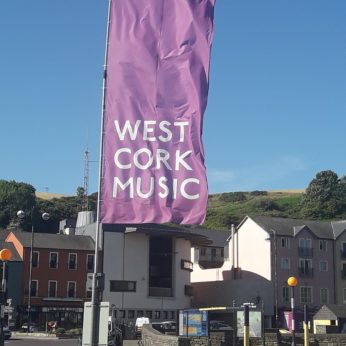Composer: Mieczyslaw Weinberg (b. 1919 - d. 1996)
Performance date: 02/07/2019
Venue: St. Brendan’s Church
Composition Year: 1992
Duration: 00:31:30
Recording Engineer: Gar Duffy, RTÉ
Instrumentation Category:Full/Chamber Orchestra
Instrumentation Other: cl, orch
Artists:
Keith Pascoe -
[violin]
Mate Bekavac -
[clarinet]
David Brophy -
[conductor]

Weinberg’s chamber symphonies are highly personal reflections of a great composer on his lifespan and that of his generation. They are like a diary of the most dramatic period in the 20th century
Gidon Kremer
Weinberg was one of the great survivors and, like all survivors, he lived with survivor’s guilt all his life. His parents escaped a Jewish pogrom in Moldova in 1903 only to end up in Warsaw in 1939 as leader of a Jewish theatre company. Weinberg’s escape from Warsaw in 1939 and later escape from Minsk in 1941 both seem miraculous as was his escape from Stalin’s NKVD. Later in life the composer himself declared: And if I consider myself marked out by the preservation of my life, then that gives me a kind of feeling that it is impossible to repay the debt, that no 24-hours-a-day, seven-days-a-week creative hard labour would take me even an inch towards paying it off.
He was hugely prolific and in later years he seemed hardly to care whether his music was performed. Until comparatively recently his music has been ignored both in the West and in Russia. The Borodin Quartet were great advocates in his lifetime and subsequently the Danel Quartet has championed his music, but perhaps the biggest impact came from the premiere in 2010 of his Auschwitz opera The Passenger, which had been composed in 1968 and left on the shelf for over forty years. Both Weinberg’s parents and his sister perished in the Nazi camps, something that gave him the right to compose on that terrible theme.
His Fourth Chamber Symphony was dedicated to another much neglected Soviet composer, Boris Tchaikovsky as a gesture of hoped-for reconciliation. The scoring is for strings, obbligato clarinet and triangle. The whole work is written in one unbroken arc in a predominantly slow tempo, creating an elegiac mood as the composer glances back at his life self-quoting without paraphrasing works that date back almost thirty years. It was his last completed work and this year we celebrate the centenary of his birth.
The gentle, ruminative Lento opens with references to Weinberg’s Gogol opera The Portrait, a quiet chorale that eventually gives way to a central section led by the clarinet. This klezmer-like passage references the first of Weinberg’s War Trilogy symphonies dedicated to the memory of the fallen in the Great Patriotic War. The movement comes to a close deep in the bass, when the hard-driven Scherzo bursts in unceremoniously led by great cries from the clarinet. After the clarinet steps back, the strings tackle the disjointed, burlesque-like ideas with great energy. The movement closes with a series of monologues begun by the clarinet followed by violin and cello solos that lead directly into the Adagio.
This wonderful movement is led by a quietly beautiful melody sung by the clarinet in music that gradually slows almost to a halt before the chorale from the first movement returns, building slowly to a single passionate climax punctuated by the clarinet. The music pauses again before reprising the movement’s opening theme. The final Andantino introduces the triangle for the first time and another delicious melody for the clarinet. In its quiet and unassuming way this farewell movement is deeply moving. Here is a man who suffered from the worst excesses of the twentieth century, who was content just to exploit his musical and dramatic genius and to live through his music. What other composer could end his final work with a single stroke on the triangle.
Francis Humphrys
Copyright © 2024 West Cork Music. All rights reserved.
Designed and developed by Matrix Internet